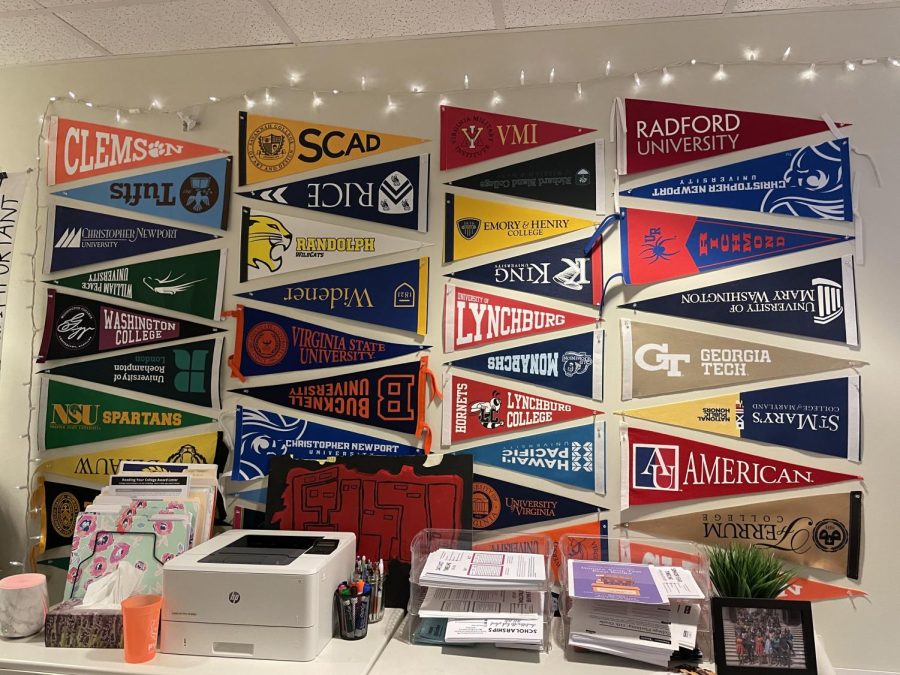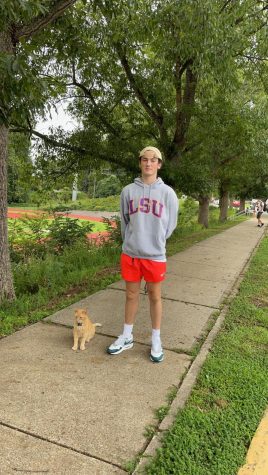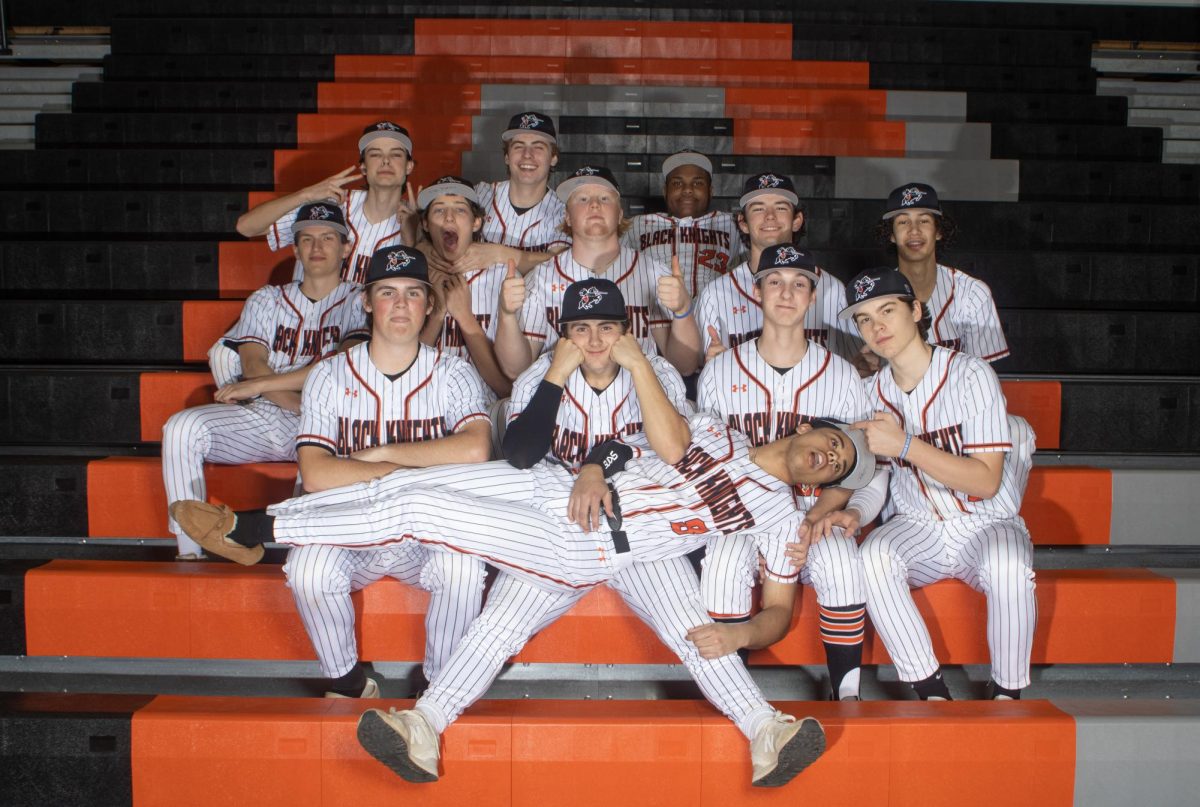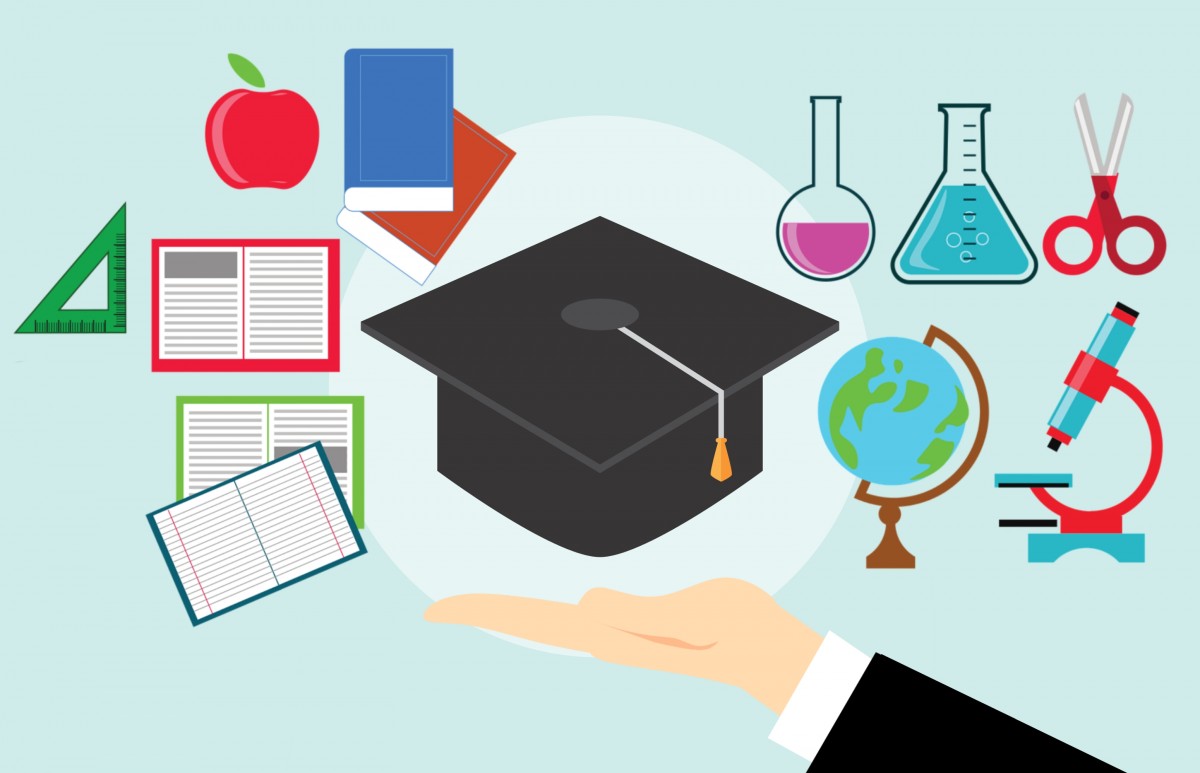Intricacies of Counseling at Charlottesville High School
A wall of university and college pennants located in Ms. Obermeyer’s office at C.H.S.
April 12, 2022
The college application process is one of the most strenuous periods for a high schooler. It requires a surplus of attention and time to properly handle and maintain one’s college applications. One aspect of this process that I think many may overlook is that applicants will need a reliable, experienced mentor to help work through this process to grasp the process’s complexity fully. This mentor may be hard to come across for many high school students.
At Charlottesville High School, our counseling team consists of six guidance counselors and one college counselor. With a student body of roughly 1,300 students, that equates to approximately 200 students per guidance counselor. The six guidance counselors are tasked with providing around-the-clock assistance for every possible issue that could arise involving a student. Family/domestic issues, mental health issues, physical health issues, monetary issues, transportation issues, and disciplinary issues are just a few examples of the problems our counselors should be trained to deal with. Add all the intricacies of post-graduate counseling to this list, and you find a very challenging workload set out for each counselor.
Our college counselor, Ms. Kalea Obermeyer, has close to 280 seniors in each graduating class who seek guidance about college applications and post-grad opportunities. Ms. Obermeyer’s job is specifically tailored to this counseling aspect: college/post-grad.
Since 2011, Charlottesville High School has partnered with the Virginia College Advising Corps (VCAC), a statewide program, to help out underprivileged students with the complications of this process. The money for this program stems from a federally-gifted block grant through the Every Student Succeeds Act of 2015; the school board uses a percentage of that grant to pay for the partnership. Ms. Obermeyer takes a large amount of pride in the help she provides for us seniors at C.H.S. Over the past few months, she has met with students individually, laid out information sessions, and created many college/career events to help with any questions surrounding the college application process that students may have. Despite her heroic efforts, many students and teachers believe there is a change to be made surrounding the college counseling department at Charlottesville High School. In a recent survey, the most commonly voiced issue with the college advising process at C.H.S. was about the ratio of college counselors to students. Not to knock any of Ms. Obermeyer’s efforts, many students acknowledge that the lone college counselor can’t provide the adequate amount of counseling needed for many students involved in the college application process.
In a 2018 article, educationweek.org found that only 33% of high schools across the country have a full-time or part-time counselor focused exclusively on college advising. For many, including Charlottesville High School, the presence of a college counselor is mainly for the advantage of low-income students who have fewer resources to obtain information about the college admissions process than someone of a higher socioeconomic class. Under this definition used for college counselors, the majority of students who aren’t low income are supposed to go to their regular guidance counselor for information and help regarding college and post-grad material. Unfortunately, with a recent increase in social and emotional day-to-day problems, many guidance counselors have found college advising at or near the bottom of their list of priorities when counseling students.
At our school, in particular, there has been a gradual shift in “culture” surrounding college-related material in the counseling department. With this increase in personal and social crises amongst the student body, ordinary guidance counselors have had to spend most of their time focusing on these specific problems that arise. This shift has left our lone college counselors to be the sole attendant in regards to all things post-grad.
A survey done in 2018 by the National Association for College Admission Counseling (NACAC) found that high school counselors are so intertwined with other problems that less than 30% of their time is directed towards college advising. More in-depth, the survey also found that private school counselors spend nearly 50% of their time on college advising, compared to 21% amongst public school counselors. With a global pandemic and four years between then and now, many have reasoned that these numbers are worsening.
Just two months ago, the United States Surgeon General published a report on a mental health crisis in our youth that the COVID-19 pandemic has furthered. The report outlined the root causes of this crisis, as well as a list of recommendations to follow that can help improve mental health amongst our youth. This ties into the importance of a practical guidance counselor. At school, where a student spends most of their childhood, a helpful mentor can help guide a student through problems that may arise throughout one’s life. Trained to handle all sorts of crises, guidance counselors are hired to help with these uprising issues; but what happens when these problems become overwhelming and begin to affect other aspects of the counseling department?
Many suggest the simple fix of having more personnel in our counseling department to solve this problem. Having more counselors will decrease the caseload of each, therefore allowing each counselor to spend more time with individual students. Under a more expanded department, a student may get the opportunity to meet with their counselor once or twice per quarter instead of once or twice per year. Therefore, students will build a closer connection with their counselor and have more assistance. Found in research papers and articles across the web, a guidance counselor’s relationship with their students is of the utmost importance. A close relationship with a guidance counselor is the difference between a good counselor and a great counselor. With a better relationship, students will begin to feel as if they can trust their guidance counselor to help them with whatever problems may arise and rely on them more for assistance.
One may look to Amherst County High School as an example, who has recently created a low-cost, but effective “Future Center” to get kids more engaged with their post-grad planning. In its inaugural year, the center has been labeled as the “hub” of the highschool. Strategically placed in a popular, high activity area, the counseling department, which includes a fellow VCAC college counselor, has created a means to expose students of all socioeconomic backgrounds to the intricacies of post graduate life.
The positive outcomes of an effective counseling department are evident in all realms of a high schooler’s trajectory. According to a research paper by Bradley University, some of these positive impacts include higher levels of academic achievement, a greater sense of happiness, safety, and security, and fewer problems in social and interpersonal relationships. By bolstering our counseling department, we could fix many issues that have plagued our school over the past several years, while at the same time putting students on a path towards success.






